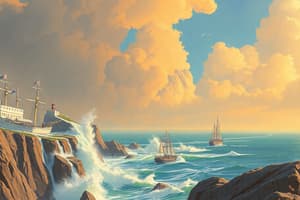Podcast
Questions and Answers
What does the narrator compare his belief in Mr. Kurtz's existence to?
What does the narrator compare his belief in Mr. Kurtz's existence to?
- Believing in a fairy tale
- Believing in life on Mars (correct)
- Believing in ghosts
- Believing in a mythical creature
How does the narrator feel about lies?
How does the narrator feel about lies?
- He detests and hates them. (correct)
- He finds them entertaining.
- He is indifferent to them.
- He finds them useful for storytelling.
What is the narrator's attitude towards his influence in Europe as perceived by others?
What is the narrator's attitude towards his influence in Europe as perceived by others?
- He feels it is a necessary pretense. (correct)
- He is proud of it.
- He finds it amusing.
- He openly rejects the notion.
What characterizes the narrator's description of dreams?
What characterizes the narrator's description of dreams?
What does the narrator suggest is impossible to convey?
What does the narrator suggest is impossible to convey?
How does the darkness affect the group's ability to communicate?
How does the darkness affect the group's ability to communicate?
What does the narrator mean by saying 'we live, as we dream—alone'?
What does the narrator mean by saying 'we live, as we dream—alone'?
What metaphor does the narrator use to describe his experience with lies?
What metaphor does the narrator use to describe his experience with lies?
What attitude does the manager display towards the idea of each station being a beacon for improvement?
What attitude does the manager display towards the idea of each station being a beacon for improvement?
What is revealed about the health of the people mentioned?
What is revealed about the health of the people mentioned?
What emotion seems to overwhelm the character when he sees the two figures discussing?
What emotion seems to overwhelm the character when he sees the two figures discussing?
What aspect of the wilderness is emphasized through the uncle's gesture?
What aspect of the wilderness is emphasized through the uncle's gesture?
What ultimately happens to the Eldorado Expedition?
What ultimately happens to the Eldorado Expedition?
How does the author characterize the relationship between the two main figures?
How does the author characterize the relationship between the two main figures?
What imagery is used to describe the shadows of the two figures?
What imagery is used to describe the shadows of the two figures?
What action do the two figures take after experiencing fright?
What action do the two figures take after experiencing fright?
What describes the condition of the ship as it is depicted in the passage?
What describes the condition of the ship as it is depicted in the passage?
What was the reaction to the ship firing at the continent?
What was the reaction to the ship firing at the continent?
How did the narrator describe the atmosphere along the coast?
How did the narrator describe the atmosphere along the coast?
What condition was affecting the men on the ship?
What condition was affecting the men on the ship?
What did the captain of the little sea-going steamer express towards the government officials?
What did the captain of the little sea-going steamer express towards the government officials?
How did the narrator feel during his travels along the coast?
How did the narrator feel during his travels along the coast?
What did the phrase 'streams of death in life' suggest about the rivers?
What did the phrase 'streams of death in life' suggest about the rivers?
What was the distance the narrator planned to travel beyond the government seat?
What was the distance the narrator planned to travel beyond the government seat?
What sound is being compared to the sound of bells in a Christian country?
What sound is being compared to the sound of bells in a Christian country?
What condition did the white companion of the narrator suffer from while traveling?
What condition did the white companion of the narrator suffer from while traveling?
What was the narrator's reaction upon encountering the body of a middle-aged negro?
What was the narrator's reaction upon encountering the body of a middle-aged negro?
What was the narrator's experience related to the carriers?
What was the narrator's experience related to the carriers?
How did the narrator perceive the Central Station upon arrival?
How did the narrator perceive the Central Station upon arrival?
What did the narrator consider scientifically interesting during the journey?
What did the narrator consider scientifically interesting during the journey?
What was the motivation behind the white companion's journey?
What was the motivation behind the white companion's journey?
What did the encounter with the hammock reveal about the narrator's condition?
What did the encounter with the hammock reveal about the narrator's condition?
What was the reason for Kurtz's change of plans during his journey?
What was the reason for Kurtz's change of plans during his journey?
How did the narrator perceive Kurtz during this encounter?
How did the narrator perceive Kurtz during this encounter?
What term was used to refer to the half-caste clerk in the discussion?
What term was used to refer to the half-caste clerk in the discussion?
What concern did the manager express regarding competition?
What concern did the manager express regarding competition?
What does the narrator imply about the dangers of the wilderness compared to Europe?
What does the narrator imply about the dangers of the wilderness compared to Europe?
What was the general opinion about delay in communication mentioned in the discussion?
What was the general opinion about delay in communication mentioned in the discussion?
What sentiment did the two figure express regarding the challenges faced in their current location?
What sentiment did the two figure express regarding the challenges faced in their current location?
How was Kurtz's state of health described at the time of departure?
How was Kurtz's state of health described at the time of departure?
Flashcards are hidden until you start studying
Study Notes
Imagery of the Ship and the Sea
- The ship appears disheveled with its ensign drooping, evoking a sense of neglect and decay.
- The ship's six-inch guns fire ineffectively into the vast emptiness, suggesting futility in warfare against nature.
- The environment is described as a "weary pilgrimage" through a gloomy landscape, reflecting hopelessness and despair.
Themes of Death and Desolation
- Constant mention of fever and mortality aboard the ship, with three crew members dying daily.
- The narrative emphasizes the grotesque reality of colonial trade, equating it to a "dance of death" amidst "overheated catacombs."
- Nature is portrayed as hostile, with references to "dangerous surf" and decaying landscapes that signify the peril faced by outsiders.
Characterization of the Captain
- The young Swede captain is characterized as lean and morose, highlighting the psychological toll of the environment.
- Dialogue reveals bitterness towards colonial officials who exploit and mistreat locals for minimal pay, adding depth to the critique of colonialism.
Kurtz and the Mystery Surrounding Him
- Kurtz is presented as an enigmatic figure whose name carries weight but whose image remains vague, akin to a mythical representation.
- Others around him perceive him with simultaneous respect and distrust, reflecting the ambiguity of colonial heroism.
Critique of Imperialism
- Characters discuss a "wandering trader," emphasizing competition among exploiters and the morally dubious nature of their enterprises.
- The narrative brings forth discussions on governance and the hypocrisy of colonial officials, who prioritize profit over ethical considerations.
Symbolism and Ambivalence
- The wilderness serves as a symbol of danger and the unknown, creating a sense of impending doom.
- The protagonist’s feelings of isolation and horror shift the focus from traditional adventure to a psychological exploration of the character's experience.
Final Thoughts and Narrative Technique
- The protagonist reflects on the inability to convey the essence of his experiences, likening it to trying to articulate a dream.
- The structure of the narrative emphasizes the fragmentation of understanding within colonial contexts, illustrating the complexities and moral ambiguities of the era.
Studying That Suits You
Use AI to generate personalized quizzes and flashcards to suit your learning preferences.




